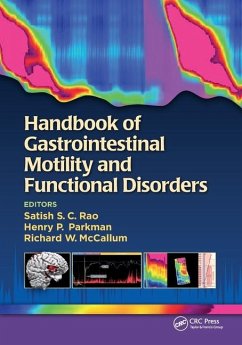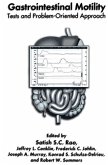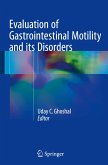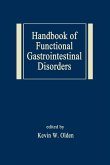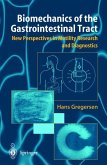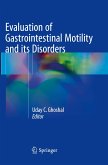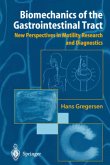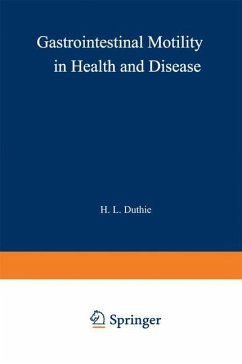Satish Rao, Henry Parkman, Richard Mccallum
Handbook of Gastrointestinal Motility and Functional Disorders
Satish Rao, Henry Parkman, Richard Mccallum
Handbook of Gastrointestinal Motility and Functional Disorders
- Broschiertes Buch
- Merkliste
- Auf die Merkliste
- Bewerten Bewerten
- Teilen
- Produkt teilen
- Produkterinnerung
- Produkterinnerung
Handbook of Gastrointestinal Motility and Functional Disorders is a user-friendly handbook that reviews the latest and most up-to-date information on the evaluation of symptoms and diagnostic tests of GI motility and functional GI disorders and a practical approach on how to treat these disorders.
Andere Kunden interessierten sich auch für
![Gastrointestinal Motility Gastrointestinal Motility]() Gastrointestinal Motility112,99 €
Gastrointestinal Motility112,99 €![Evaluation of Gastrointestinal Motility and its Disorders Evaluation of Gastrointestinal Motility and its Disorders]() Evaluation of Gastrointestinal Motility and its Disorders67,99 €
Evaluation of Gastrointestinal Motility and its Disorders67,99 €![Handbook of Functional Gastrointestinal Disorders Handbook of Functional Gastrointestinal Disorders]() Kevin W. Olden (ed.)Handbook of Functional Gastrointestinal Disorders237,99 €
Kevin W. Olden (ed.)Handbook of Functional Gastrointestinal Disorders237,99 €![Biomechanics of the Gastrointestinal Tract Biomechanics of the Gastrointestinal Tract]() Hans GregersenBiomechanics of the Gastrointestinal Tract115,99 €
Hans GregersenBiomechanics of the Gastrointestinal Tract115,99 €![Evaluation of Gastrointestinal Motility and its Disorders Evaluation of Gastrointestinal Motility and its Disorders]() Evaluation of Gastrointestinal Motility and its Disorders67,99 €
Evaluation of Gastrointestinal Motility and its Disorders67,99 €![Biomechanics of the Gastrointestinal Tract Biomechanics of the Gastrointestinal Tract]() Hans GregersenBiomechanics of the Gastrointestinal Tract112,99 €
Hans GregersenBiomechanics of the Gastrointestinal Tract112,99 €![Gastrointestinal Motility in Health and Disease Gastrointestinal Motility in Health and Disease]() Gastrointestinal Motility in Health and Disease121,99 €
Gastrointestinal Motility in Health and Disease121,99 €-
-
-
Handbook of Gastrointestinal Motility and Functional Disorders is a user-friendly handbook that reviews the latest and most up-to-date information on the evaluation of symptoms and diagnostic tests of GI motility and functional GI disorders and a practical approach on how to treat these disorders.
Hinweis: Dieser Artikel kann nur an eine deutsche Lieferadresse ausgeliefert werden.
Hinweis: Dieser Artikel kann nur an eine deutsche Lieferadresse ausgeliefert werden.
Produktdetails
- Produktdetails
- Verlag: CRC Press
- Seitenzahl: 374
- Erscheinungstermin: 15. Mai 2015
- Englisch
- Abmessung: 254mm x 178mm x 20mm
- Gewicht: 703g
- ISBN-13: 9781617118180
- ISBN-10: 1617118184
- Artikelnr.: 41963439
- Herstellerkennzeichnung
- Libri GmbH
- Europaallee 1
- 36244 Bad Hersfeld
- gpsr@libri.de
- Verlag: CRC Press
- Seitenzahl: 374
- Erscheinungstermin: 15. Mai 2015
- Englisch
- Abmessung: 254mm x 178mm x 20mm
- Gewicht: 703g
- ISBN-13: 9781617118180
- ISBN-10: 1617118184
- Artikelnr.: 41963439
- Herstellerkennzeichnung
- Libri GmbH
- Europaallee 1
- 36244 Bad Hersfeld
- gpsr@libri.de
Satish S.C. Rao, MD, PhD, FRCP graduated from Osmania Medical College in Hyderabad, India. Subsequently, he completed his graduate medical education and GI Fellowship and Clinical Research training at several UK hospitals, notably Royal Hallamshire Hospital, Sheffield, and Royal Liverpool Hospitals before becoming a Fellow of the Royal College of Physicians in London. He earned his PhD from the University of Sheffield in the United Kingdom. He joined the faculty at the University of Iowa in 1991 where he participated in many National Institutes of Health (NIH)-funded research projects and cofounded the Pelvic Floor Group. In 2011, Dr. Rao was recruited to the Medical College of Georgia, Georgia Regents University, Augusta, Georgia, to serve as professor of medicine, chief of the Section of Gastroenterology/Hepatology, and the new founding director of the Digestive Health Center and the GI Service Line. In this role, he is leading an aggressive initiative to expand the university's capabilities in treating digestive disorders that includes a brand-new Digestive Health Center and a state-of-the-art, 5-room neurogastroenterology and motility suite. He plans to work closely with colleagues in surgery, urology, otolaryngology, and neurology to create a model system of interdisciplinary care for GI motility patients. Dr. Rao is past president of the American Neurogastroenterology and Motility Society. He received the 3 highest honors from the American Gastroenterological Association: the Distinguished Clinician Award, the Masters Award for Outstanding Clinical Research, and the Distinguished Educator Award. He received the Auxiliary Research Award from the American College of Gastroenterology and several international awards for his research and teaching. He serves on the editorial board of several journals, is cochair of AGA Council on Neurogastroentrology and GI Motility, has published over 300 articles, and has edited 5 books on GI motility. Henry P. Parkman, MD joined the faculty of Temple University School of Medicine in 1990, and has been actively involved in studying GI motility at both the basic science and clinical levels. His clinical focus has been treating patients with GI motility disorders, primarily gastroparesis. Clinically at Temple, Dr. Parkman is in charge of the GI Motility Laboratory that assesses GI motility dysfunction in patients. His clinical laboratory has developed expertise in a comprehensive array of GI motility tests for clinical evaluation of patients, including specialized tests of esophageal and gastric motility. This is a referral center for the evaluation and treatment of GI motility disorders. Dr. Parkman was funded for 10 years with an NIH K24 Midcareer Investigator Award in Patient-Oriented Research entitled "Novel Evaluation & Treatment of Gastric Dysmotility," which, in addition to funding research in gastric motility, provided time for him to mentor young investigators in clinical research. Through this research, studies were performed on novel ways to assess gastric emptying. Dr. Parkman is currently a funded member of the NIH Gastroparesis Clinical Research Consortium, now in its second 5-year cycle, established by the NIDDK to enhance the understanding of gastroparesis. This research has better defined the syndromes of diabetic and idiopathic gastroparesis, and the consortium is now conducting clinical trials to help better treat patients with their refractory symptoms of nausea and vomiting. His manuscript on the use of nortriptyline for nausea and abdominal pain in gastroparesis recently appeared in JAMA. He is currently studying the neurokinin receptor antagonist aprepitant as a treatment for the nausea and vomiting seen in gastroparesis. During his presidency of the American Neurogastroenterological and Motility Society, Dr. Parkman helped standardize the radionuclide gastric emptying study and make it a more standardized test that can be done at different institutions in a uniform fashion. He remains active with an initiative to develop a patient-reported outcome (PRO) for gastroparesis that meets the approval of the Food and Drug Administration (FDA). This would help ease the study of treatments for gastroparesis, which are greatly needed. Richard W. McCallum, MD, FACP, FRACP (AUST), FACG, AGAF is professor and founding chairman of the Department of Internal Medicine, Texas Tech University Health Sciences Center at El Paso. Dr. McCallum also serves as director of the Center for Neurogastroenterology and GI Motility and Functional Bowel Disorders, a referral and research center for patients locally, regionally, and nationally. After completing his undergraduate studies at the University of Queensland, he earned his medical degree at the Queensland Medical School in Brisbane, Australia. Dr. McCallum completed gastroenterology fellowship training at the University of California in Los Angeles and Wadsworth VA Medical Center. He joined the faculty of Yale University School of Medicine in 1996. Dr. McCallum was professor of medicine chief and program director of the Division of Gastroenterology, Hepatology, and Nutrition at the University of Virginia School of Medicine, Charlottesville, Virginia, from 1985 to 1996, where he was awarded the Paul Janssen Endowed Chair and Professorship. From 1996 to 2004, Dr. McCallum was chief and program director, Division of Gastroenterology and Hepatology, University of Kansas Medical Center, Kansas City, and then became director of the Center for GI Nerve and Muscle Function and chief of Division of GI Motility, University of Kansas School of Medicine from 2004 to 2009 before being recruited as the founding chair of the new Paul L. Foster School of Medicine in El Paso in 2009. Among his professional honors and memberships are Fellow of the American College of Physicians, Fellow of the Royal Australiasian College of Physicians, Fellow of the American College of Gastroenterology, Fellow of the American Gastroenterology Association, member of the American Society for Clinical Investigation, President and Founders Medal Recipient of the Southern Society for Clinical Investigation, Moreton Award for Original Research in Medicine, and the CURE Award for Diabetes Research, and the Chancellor's Distinguished Research Award at Texas Tech University. He is currently President of the International Gastrointestinal Electrophysiology Society. Dr. McCallum's area of clinical interest and research is the field of GI motility, neurogastroenterology, and functional bowel disorders. He has been focused on advancing knowledge related to pathophysiology, diagnostic approaches, pharmacology, and device technology. He is a pioneer in the area of gut electrophysiology and developed the concept of electrical "pacing" of the stomach to treat gastroparesis and nausea and vomiting, particularly related to diabetes mellitus. Recently, he has contributed to major advances in understanding and management of cyclic vomiting syndrome in adults, "dumping syndrome," and rumination syndrome and has potentially revolutionized the field of gastroparesis and functional dyspepsia by developing and reporting a new technique to nonsurgically obtain gastric smooth muscle tissue by endoscopic ultrasound biopsy. Dr. McCallum's research has been funded by the American Diabetes Association VA Medical Centers and NIH. Currently, he is funded by the NIH Gastroparesis Clinical Research Consortium. Established by NIDDK and initiated in 2008, it has been renewed for a further 5 years. The program has developed the world's largest database of gastroparesis patients and conducts cutting-edge basic translational and therapeutic research. Dr. McCallum was recently awarded funding from the International Foundation for Functional Gastrointestinal Diseases (IFFDG) to study a new therapy, transcutaneous electrical stimulation, in patients with nausea, vomiting, and idiopathic gastroparesis. He has published over 400 articles in peer-reviewed scientific journals, more than 100 chapters in textbooks, edited 15 textbooks, and has 3 active patents on GI therapies.
Dedication About the Editors Acknowledgments Contributing Authors Preface Foreword by Robert S. Fisher
MD Introduction Section I Esophageal Disorders Chapter 1 Esophageal Symptoms: Dysphagia
Heartburn
and Esophageal Chest PainMaria Samuel
MD and C. Prakash Gyawali
MD
MRCP Chapter 2 Gastroesophageal Reflux DiseaseWojciech Blonski
MD
PhD and Joel E. Richter
MD
FACP
MACG Chapter 3 AchalasiaAndrew J. Gawron
MD
PhD
MS and John E. Pandolfino
MD
MSCI Chapter 4 Esophageal Spasm and Hypercontractile and Hypertensive Motility DisordersMark R. Fox
MD
MA
FRCP and Rami Sweis
MD
PhD
MRCP Chapter 5 Cricopharyngeal DisordersKevin A. Ghassemi
MD and Jeffrey L. Conklin
MD Chapter 6 Esophageal HypersensitivityJose M. Remes-Troche
MD and Ronnie Fass
MD Section II Gastric Disorders Chapter 7 Symptoms of Gastric Dysmotility: Nausea
Vomiting
Abdominal Pain
Postprandial Fullness
and Early SatietyWilliam L. Hasler
MD Chapter 8 GastroparesisSameer Dhalla
MD
MHS and Pankaj Jay Pasricha
MD Chapter 9 Functional DyspepsiaJan Tack
MD
PhD Chapter 10 Dumping SyndromePatrick Berg
BS and Richard W. McCallum
MD
FACP
FRACP (AUST)
FACG
AGAF Chapter 11 Cyclic Vomiting SyndromeThangam Venkatesan
MD and Erica A. Samuel
MD Chapter 12 Rumination SyndromeChad J. Cooper
MD; Joseph K. Sunny
Jr
MD; and Richard W. McCallum
MD
FACP
FRACP (AUST)
FACG
AGAF Section III Small Intestinal Disorders Chapter 13 Small Intestinal Dysmotility Symptoms: Bloating
Distension
and GasJuan R. Malagelada
MD and Carolina Malagelada
PhD
MD Chapter 14 Chronic Intestinal Pseudo-obstructionRobert M. Siwiec
MD and John M. Wo
MD Chapter 15 Small Intestinal Bacterial OvergrowthBaha Moshiree
MD and Yehuda Ringel
MD
AGAF
FACG Chapter 16 Food Intolerance and Dietary Concepts in Functional Bowel DisordersAbimbola O. Aderinto-Adike
MD and Eamonn M.M. Quigley
MD
FRCP
FACP
FACG
FRCPI Section IV Colonic and Anorectal Disorders Chapter 17 Colonic Symptoms: Constipation
Diarrhea
and Fecal IncontinenceLawrence R. Schiller
MD Chapter 18 Irritable Bowel SyndromeElizabeth J. Videlock
MD and Lin Chang
MD Chapter 19 Slow Transit ConstipationRichard J. Saad
MD
MS Chapter 20 Dyssynergic Defecation and ConstipationGina Sam
MD
MPH and Satish S.C. Rao
MD
PhD
FRCP Chapter 21 Fecal IncontinenceWilliam E. Whitehead
PhD; Steve Heymen
PhD; and Giuseppe Chiarioni
MD Chapter 22 Anorectal Disorders: Fecal Impaction
Descending Perineum Syndrome
Rectocele
and Levator Ani SyndromeSatish S.C. Rao
MD
PhD
FRCP and Kulthep Rattanakovit
MD Chapter 23 Diabetes and the GutChristopher K. Rayner
MBBS
PhD
FRACP; Karen L. Jones
Dip App Sci (Nuc Med)
PhD; and Michael Horowitz
MBBS
PhD
FRACP Chapter 24 Scleroderma and the GutDeborah M. Bethards
MD and Ann Ouyang
MD Chapter 25 Opiate-Induced Bowel DysfunctionEva Szigethy
MD
PhD; Marc Schwartz
MD; and Douglas A. Drossman
MD Financial Disclosures Index
MD Introduction Section I Esophageal Disorders Chapter 1 Esophageal Symptoms: Dysphagia
Heartburn
and Esophageal Chest PainMaria Samuel
MD and C. Prakash Gyawali
MD
MRCP Chapter 2 Gastroesophageal Reflux DiseaseWojciech Blonski
MD
PhD and Joel E. Richter
MD
FACP
MACG Chapter 3 AchalasiaAndrew J. Gawron
MD
PhD
MS and John E. Pandolfino
MD
MSCI Chapter 4 Esophageal Spasm and Hypercontractile and Hypertensive Motility DisordersMark R. Fox
MD
MA
FRCP and Rami Sweis
MD
PhD
MRCP Chapter 5 Cricopharyngeal DisordersKevin A. Ghassemi
MD and Jeffrey L. Conklin
MD Chapter 6 Esophageal HypersensitivityJose M. Remes-Troche
MD and Ronnie Fass
MD Section II Gastric Disorders Chapter 7 Symptoms of Gastric Dysmotility: Nausea
Vomiting
Abdominal Pain
Postprandial Fullness
and Early SatietyWilliam L. Hasler
MD Chapter 8 GastroparesisSameer Dhalla
MD
MHS and Pankaj Jay Pasricha
MD Chapter 9 Functional DyspepsiaJan Tack
MD
PhD Chapter 10 Dumping SyndromePatrick Berg
BS and Richard W. McCallum
MD
FACP
FRACP (AUST)
FACG
AGAF Chapter 11 Cyclic Vomiting SyndromeThangam Venkatesan
MD and Erica A. Samuel
MD Chapter 12 Rumination SyndromeChad J. Cooper
MD; Joseph K. Sunny
Jr
MD; and Richard W. McCallum
MD
FACP
FRACP (AUST)
FACG
AGAF Section III Small Intestinal Disorders Chapter 13 Small Intestinal Dysmotility Symptoms: Bloating
Distension
and GasJuan R. Malagelada
MD and Carolina Malagelada
PhD
MD Chapter 14 Chronic Intestinal Pseudo-obstructionRobert M. Siwiec
MD and John M. Wo
MD Chapter 15 Small Intestinal Bacterial OvergrowthBaha Moshiree
MD and Yehuda Ringel
MD
AGAF
FACG Chapter 16 Food Intolerance and Dietary Concepts in Functional Bowel DisordersAbimbola O. Aderinto-Adike
MD and Eamonn M.M. Quigley
MD
FRCP
FACP
FACG
FRCPI Section IV Colonic and Anorectal Disorders Chapter 17 Colonic Symptoms: Constipation
Diarrhea
and Fecal IncontinenceLawrence R. Schiller
MD Chapter 18 Irritable Bowel SyndromeElizabeth J. Videlock
MD and Lin Chang
MD Chapter 19 Slow Transit ConstipationRichard J. Saad
MD
MS Chapter 20 Dyssynergic Defecation and ConstipationGina Sam
MD
MPH and Satish S.C. Rao
MD
PhD
FRCP Chapter 21 Fecal IncontinenceWilliam E. Whitehead
PhD; Steve Heymen
PhD; and Giuseppe Chiarioni
MD Chapter 22 Anorectal Disorders: Fecal Impaction
Descending Perineum Syndrome
Rectocele
and Levator Ani SyndromeSatish S.C. Rao
MD
PhD
FRCP and Kulthep Rattanakovit
MD Chapter 23 Diabetes and the GutChristopher K. Rayner
MBBS
PhD
FRACP; Karen L. Jones
Dip App Sci (Nuc Med)
PhD; and Michael Horowitz
MBBS
PhD
FRACP Chapter 24 Scleroderma and the GutDeborah M. Bethards
MD and Ann Ouyang
MD Chapter 25 Opiate-Induced Bowel DysfunctionEva Szigethy
MD
PhD; Marc Schwartz
MD; and Douglas A. Drossman
MD Financial Disclosures Index
Dedication About the Editors Acknowledgments Contributing Authors Preface Foreword by Robert S. Fisher
MD Introduction Section I Esophageal Disorders Chapter 1 Esophageal Symptoms: Dysphagia
Heartburn
and Esophageal Chest PainMaria Samuel
MD and C. Prakash Gyawali
MD
MRCP Chapter 2 Gastroesophageal Reflux DiseaseWojciech Blonski
MD
PhD and Joel E. Richter
MD
FACP
MACG Chapter 3 AchalasiaAndrew J. Gawron
MD
PhD
MS and John E. Pandolfino
MD
MSCI Chapter 4 Esophageal Spasm and Hypercontractile and Hypertensive Motility DisordersMark R. Fox
MD
MA
FRCP and Rami Sweis
MD
PhD
MRCP Chapter 5 Cricopharyngeal DisordersKevin A. Ghassemi
MD and Jeffrey L. Conklin
MD Chapter 6 Esophageal HypersensitivityJose M. Remes-Troche
MD and Ronnie Fass
MD Section II Gastric Disorders Chapter 7 Symptoms of Gastric Dysmotility: Nausea
Vomiting
Abdominal Pain
Postprandial Fullness
and Early SatietyWilliam L. Hasler
MD Chapter 8 GastroparesisSameer Dhalla
MD
MHS and Pankaj Jay Pasricha
MD Chapter 9 Functional DyspepsiaJan Tack
MD
PhD Chapter 10 Dumping SyndromePatrick Berg
BS and Richard W. McCallum
MD
FACP
FRACP (AUST)
FACG
AGAF Chapter 11 Cyclic Vomiting SyndromeThangam Venkatesan
MD and Erica A. Samuel
MD Chapter 12 Rumination SyndromeChad J. Cooper
MD; Joseph K. Sunny
Jr
MD; and Richard W. McCallum
MD
FACP
FRACP (AUST)
FACG
AGAF Section III Small Intestinal Disorders Chapter 13 Small Intestinal Dysmotility Symptoms: Bloating
Distension
and GasJuan R. Malagelada
MD and Carolina Malagelada
PhD
MD Chapter 14 Chronic Intestinal Pseudo-obstructionRobert M. Siwiec
MD and John M. Wo
MD Chapter 15 Small Intestinal Bacterial OvergrowthBaha Moshiree
MD and Yehuda Ringel
MD
AGAF
FACG Chapter 16 Food Intolerance and Dietary Concepts in Functional Bowel DisordersAbimbola O. Aderinto-Adike
MD and Eamonn M.M. Quigley
MD
FRCP
FACP
FACG
FRCPI Section IV Colonic and Anorectal Disorders Chapter 17 Colonic Symptoms: Constipation
Diarrhea
and Fecal IncontinenceLawrence R. Schiller
MD Chapter 18 Irritable Bowel SyndromeElizabeth J. Videlock
MD and Lin Chang
MD Chapter 19 Slow Transit ConstipationRichard J. Saad
MD
MS Chapter 20 Dyssynergic Defecation and ConstipationGina Sam
MD
MPH and Satish S.C. Rao
MD
PhD
FRCP Chapter 21 Fecal IncontinenceWilliam E. Whitehead
PhD; Steve Heymen
PhD; and Giuseppe Chiarioni
MD Chapter 22 Anorectal Disorders: Fecal Impaction
Descending Perineum Syndrome
Rectocele
and Levator Ani SyndromeSatish S.C. Rao
MD
PhD
FRCP and Kulthep Rattanakovit
MD Chapter 23 Diabetes and the GutChristopher K. Rayner
MBBS
PhD
FRACP; Karen L. Jones
Dip App Sci (Nuc Med)
PhD; and Michael Horowitz
MBBS
PhD
FRACP Chapter 24 Scleroderma and the GutDeborah M. Bethards
MD and Ann Ouyang
MD Chapter 25 Opiate-Induced Bowel DysfunctionEva Szigethy
MD
PhD; Marc Schwartz
MD; and Douglas A. Drossman
MD Financial Disclosures Index
MD Introduction Section I Esophageal Disorders Chapter 1 Esophageal Symptoms: Dysphagia
Heartburn
and Esophageal Chest PainMaria Samuel
MD and C. Prakash Gyawali
MD
MRCP Chapter 2 Gastroesophageal Reflux DiseaseWojciech Blonski
MD
PhD and Joel E. Richter
MD
FACP
MACG Chapter 3 AchalasiaAndrew J. Gawron
MD
PhD
MS and John E. Pandolfino
MD
MSCI Chapter 4 Esophageal Spasm and Hypercontractile and Hypertensive Motility DisordersMark R. Fox
MD
MA
FRCP and Rami Sweis
MD
PhD
MRCP Chapter 5 Cricopharyngeal DisordersKevin A. Ghassemi
MD and Jeffrey L. Conklin
MD Chapter 6 Esophageal HypersensitivityJose M. Remes-Troche
MD and Ronnie Fass
MD Section II Gastric Disorders Chapter 7 Symptoms of Gastric Dysmotility: Nausea
Vomiting
Abdominal Pain
Postprandial Fullness
and Early SatietyWilliam L. Hasler
MD Chapter 8 GastroparesisSameer Dhalla
MD
MHS and Pankaj Jay Pasricha
MD Chapter 9 Functional DyspepsiaJan Tack
MD
PhD Chapter 10 Dumping SyndromePatrick Berg
BS and Richard W. McCallum
MD
FACP
FRACP (AUST)
FACG
AGAF Chapter 11 Cyclic Vomiting SyndromeThangam Venkatesan
MD and Erica A. Samuel
MD Chapter 12 Rumination SyndromeChad J. Cooper
MD; Joseph K. Sunny
Jr
MD; and Richard W. McCallum
MD
FACP
FRACP (AUST)
FACG
AGAF Section III Small Intestinal Disorders Chapter 13 Small Intestinal Dysmotility Symptoms: Bloating
Distension
and GasJuan R. Malagelada
MD and Carolina Malagelada
PhD
MD Chapter 14 Chronic Intestinal Pseudo-obstructionRobert M. Siwiec
MD and John M. Wo
MD Chapter 15 Small Intestinal Bacterial OvergrowthBaha Moshiree
MD and Yehuda Ringel
MD
AGAF
FACG Chapter 16 Food Intolerance and Dietary Concepts in Functional Bowel DisordersAbimbola O. Aderinto-Adike
MD and Eamonn M.M. Quigley
MD
FRCP
FACP
FACG
FRCPI Section IV Colonic and Anorectal Disorders Chapter 17 Colonic Symptoms: Constipation
Diarrhea
and Fecal IncontinenceLawrence R. Schiller
MD Chapter 18 Irritable Bowel SyndromeElizabeth J. Videlock
MD and Lin Chang
MD Chapter 19 Slow Transit ConstipationRichard J. Saad
MD
MS Chapter 20 Dyssynergic Defecation and ConstipationGina Sam
MD
MPH and Satish S.C. Rao
MD
PhD
FRCP Chapter 21 Fecal IncontinenceWilliam E. Whitehead
PhD; Steve Heymen
PhD; and Giuseppe Chiarioni
MD Chapter 22 Anorectal Disorders: Fecal Impaction
Descending Perineum Syndrome
Rectocele
and Levator Ani SyndromeSatish S.C. Rao
MD
PhD
FRCP and Kulthep Rattanakovit
MD Chapter 23 Diabetes and the GutChristopher K. Rayner
MBBS
PhD
FRACP; Karen L. Jones
Dip App Sci (Nuc Med)
PhD; and Michael Horowitz
MBBS
PhD
FRACP Chapter 24 Scleroderma and the GutDeborah M. Bethards
MD and Ann Ouyang
MD Chapter 25 Opiate-Induced Bowel DysfunctionEva Szigethy
MD
PhD; Marc Schwartz
MD; and Douglas A. Drossman
MD Financial Disclosures Index

